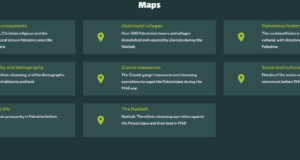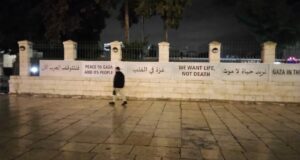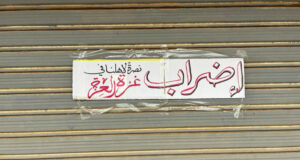22nd January 2015 | International Solidarity Movement, Nablus Team | Awarta, Occupied Palestine
Two weeks after his release from prison, ISM activists had the opportunity to sit with Aiman Awwad and his friend, Samer Zaqah, in their hometown of Awarta. Aiman was arrested in June 2004, at the age of 20, and released in January 2015, jailed for a total of ten and a half years in multiple Israeli military prisons. He was previously arrested at the age of 14, and shot in the leg by an Israeli solider. Samer was imprisoned nine and a half years.
For the first two years of his imprisonment, Aiman was not allowed any visitors or any contact with the outside world. His mother was later permitted to be his only visitor for the duration of his sentence; a visit which was allowed to occur only once a month. In the prisons, small rooms sometimes housed 8-10 men, with little, if any heat during cold months. On one occasion, a prison guard turned off the hot water on a cold, rainy day. After failed attempts to convince the authorities to turn it back on, a Palestinian prisoner broke a cup on a solider, and was shot directly. Medical care in the prisons was described as very limited, and the numbers of sick were often large. In cases of severe illness, prisoners were not allowed to leave to receive sufficient medical care.
On describing their experiences in prison, the two men recounted the problems with soldiers and arbitrary power given to them. They also describe the solidarity between prisoners. Aiman went on hunger strike three times while imprisoned. On one occasion, he refused food for one month, in an attempt to protest the detainment of a friend in solidarity confinement. Most people align themselves with a Palestinian political party in jail, for material and emotional support. In the walls outside of the many Israeli prisons, these parties rarely seem to agree, yet within the confines of the military walls, it seems that they all get along.
Israel is known for its use of administrative detention, a policy handed down from the British Mandate period. Under this policy, the state is able to detain and imprison people without charge or trial, often for indefinite periods. Once someone is released from administrative detention, it is not uncommon for them to be re-arrested shortly after. As of October 1, 2014, there were 6,500 Palestinian political prisoners in Israeli jails. Amongst these, 500 were detained under administrative detention, and 182 were minors. Aiman described his own day in court as ‘like a picture,’ feeling that his fate was already decided before facing trial. The men described the fear of speaking or acting against the Israeli state, citing the extensive surveillance of Israeli intelligence and how this is used to control people’s behaviour. Living under Israeli occupation has definitely taken its toll; the men describe it as ‘[living where] we cannot breathe. The hands of Israel wring around our necks.’
When asked what they think the logic is behind Israel’s massive detainment of Palestinians, the men speak of the pressure and punishment Israel hopes to exert on Palestinians. Israel invokes fear and seeks to gain control over Palestine. But for Aiman, this has not worked; ‘This is my country. I love my country. Our land is like the soul. It cannot be taken, or crushed. Not after 10 years, not after 20.’
Upon his release, there was a celebratory parade throughout the village in Awarta, as has become custom across Occupied Palestine. Describing his feelings on his return home, Aiman said he was of two minds; he was very happy to be once again with his family, but felt very bad to leave behind his best friends in jail. Before his arrest, there were no settlements in the hills surrounding Awarta, and the annexation wall was just beginning construction. There was no facebook, no smart phones, and Aiman is adamant about hanging on to his cellphone with only calling and basic texting capacity. His cousins were children before his arrest, and he came home to full-grown adults. He wants to travel, but Israel denies foreign travel to former political prisoners.
Our conversation is filled with appreciation for the kindness and hospitality of Palestinian culture. People take care of each other, and have respect for everybody, but Israel is determined to undermine that by dividing families and imprisoning young (and old) for large parts of their formative years, and in some cases their entire lives.
When asked what they want to do now, Samer and Aiman differ in their answers. Samer explains, ‘I just want to build my life. I just want to be free. We dont have a problems with Jews, just the occupation. We dont want to struggle with guns. We need the help of other countries to pressure Israel.’ Aiman wants to go to university, and study. He is determined, however, not to give up on Palestine. ‘The solider thinks he can kill us, and we will give up the land. But we must continue for us. We have a message: we must be together, the parties must be together and strong for Palestine to be free.’ When asked if his views have changed on the Palestinian struggle and resistance, he is adamant: no. Israel will not break him.
 International Solidarity Movement Nonviolence. Justice. Freedom.
International Solidarity Movement Nonviolence. Justice. Freedom.


